Pure Earth teams around the world joined WHO and dozens of other organizations in marking the 11th year of International Lead Poisoning Prevention Week (ILPPW) galvanizing efforts around this year’s theme, “End Childhood Lead Poisoning”.
The WHO expanded the list of sources of lead exposure in campaign materials this year – an important signal that the global health community is looking at the additional sources of lead poisoning beyond lead paint.
Important sources of exposure to lead include environmental contamination from mining, smelting, manufacturing and recycling activities and the use of lead in a wide-range of products. The majority of global lead consumption is for the manufacture of lead-acid batteries for motor vehicles. Other products containing lead include pigments, paints, solder, stained glass, lead crystal glassware, ammunition, ceramic glazes, jewelry, toys, some common electrical and electronic items, some cosmetics such as kohl and sindoor and traditional medicines used in countries such as India, Mexico and VietNam. Drinking water delivered through lead pipes or pipes joined with lead solder may contain lead. Much of the lead in global commerce comes from recycling operations.
The week afforded Pure Earth the opportunity to highlight its impactful initiatives to reduce lead exposure and poisoning. Let’s take a closer look at the activities conducted in Bangladesh, Ghana, India, Indonesia, Peru, and Colombia during this significant week.
Global Launch of Strengthening Health Systems to Reduce Lead Exposure – New Five Country Program
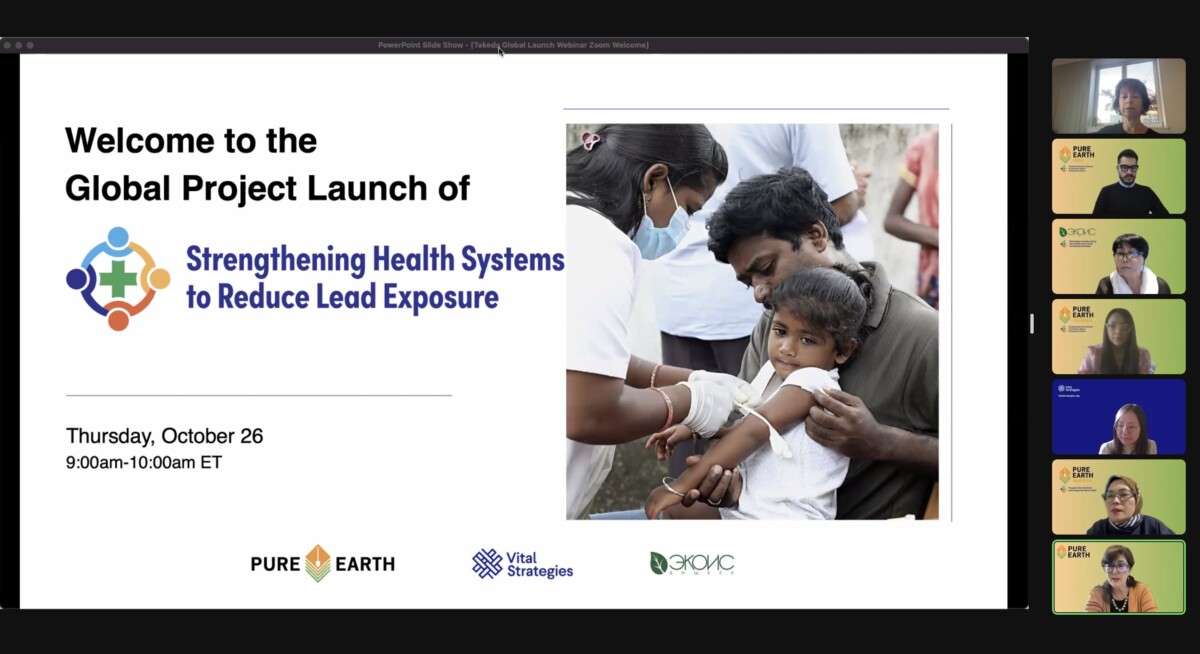
Pure Earth HQ in New York organized the virtual global launch of Strengthening Health Systems to Reduce Lead Exposure, a new project to strengthen national healthcare systems in five countries to reduce lead poisoning. Support for this project comes from Takeda’s Global CSR program.
The program launch brought together leaders from Colombia, Indonesia, Kyrgyzstan, Maharashtra, India, and Peru, with over 130 attendees online, to discuss the collaborations in development with ministries of health to strengthen national healthcare systems to detect, treat, reduce and prevent lead poisoning. The virtual event underscored the growing urgent commitment to address lead poisoning on a global scale. Attendees also heard from government representatives and key stakeholders in the 5 countries via a video explaining the goals and approach to the project.
A panel discussion followed the video, moderated by Alicia Ogawa, Pure Earth Board Member, and included:
- Dr. Yi Lu, Director, Childhood Lead Poisoning Prevention Program, Vital Strategies
- Dr. Nitin Ambadekar, Additional Director of Health Services (RCH), State Family Welfare Bureau, Pune Maharashtra, India
- Lizeth Olaya, Country Director, Pure Earth Colombia
- Indira Zhakipova, Director, Ecois Bishkek, Kyrgyzstan
- Budi Susilorini, Director, Pure Earth Indonesia Foundation
- Rodrigo Velarde, Country Director, Pure Earth Perú
The webinar was followed by an audience Q&A.
Bangladesh: Millions Reached: Lead Pollution Solutions Spotlighted in Exhibition and online campaigns
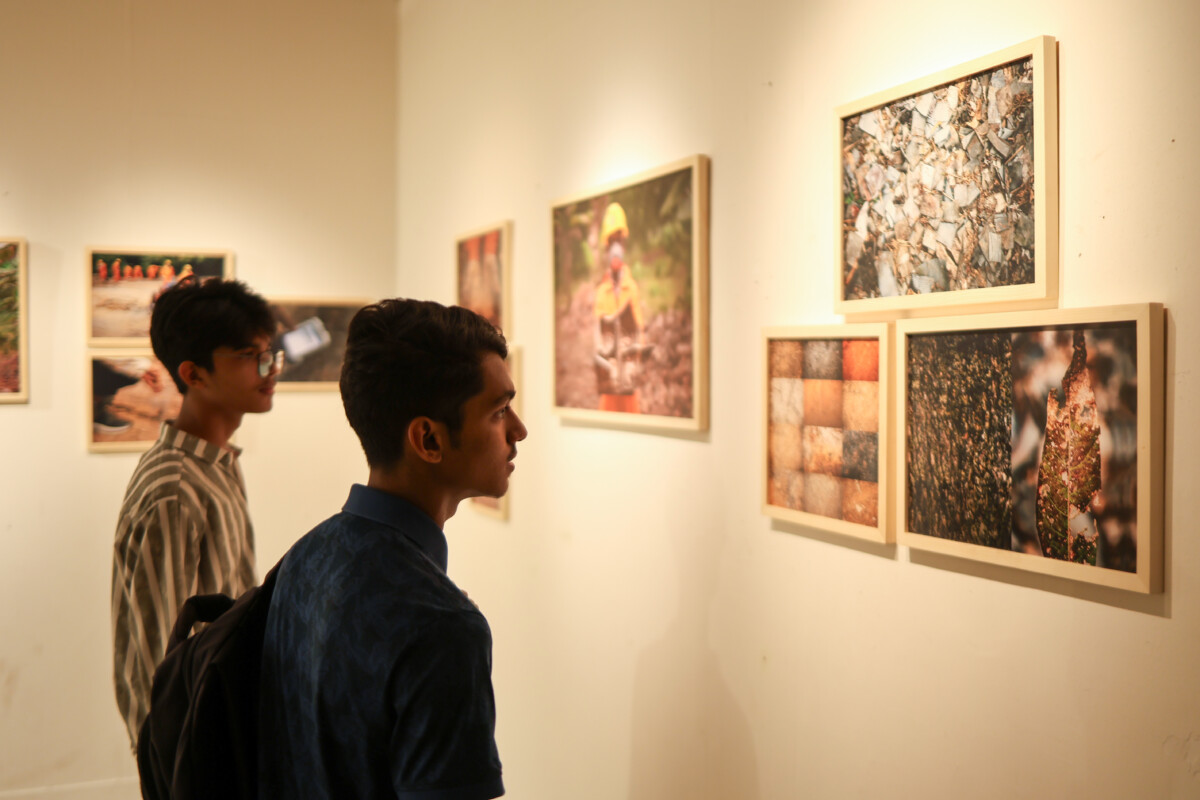 During this year’s ILPPW campaign, Pure Earth Bangladesh focused on enhancing the visibility of Pure Earth Bangladesh’s grassroots initiatives and underscoring evidence-based solutions through an online campaign and a photography exhibition.
During this year’s ILPPW campaign, Pure Earth Bangladesh focused on enhancing the visibility of Pure Earth Bangladesh’s grassroots initiatives and underscoring evidence-based solutions through an online campaign and a photography exhibition.
On October 25, 2023, in collaboration with the Department of Environment (DoE) and the Directorate General of Health Services (DGHS), Pure Earth Bangladesh inaugurated a three-day photography exhibition titled “Solve Lead Pollution, Save Future Generations” at Shilpakala Academy, Dhaka. Attended by over 300 people, the exhibition featured photographs illustrating Pure Earth’s five-phase solution to lead pollution and employed an X-Ray Fluorescence (XRF) machine to demonstrate lead contamination in consumer products. The exhibition prompted key stakeholders, including Ms. Razinara Begum and Mohammod Solaiman Haider from the Department of Environment (DoE), and Anwar Sadat from the Directorate General of Health Services (DGHS), to emphasize the importance of prevention, awareness, and multi-sectoral collaboration.
The event garnered coverage from 10 media outlets, including prominent platforms such as Dhaka Tribune, Prothom-Alo, and Samakal. Concurrently, a 20-day social media campaign on Facebook and Twitter channels reached over 760,000 people, with about 40,000 virtual engagements and 950,000 impressions. Embracing the ILPPW slogan, “End Childhood Lead Poisoning,” the campaign called for unified efforts from governments, civil society, health partners, and industries to address and solve lead pollution issues.
Ghana: Major Government Commitment and Collaboration on Awareness Events
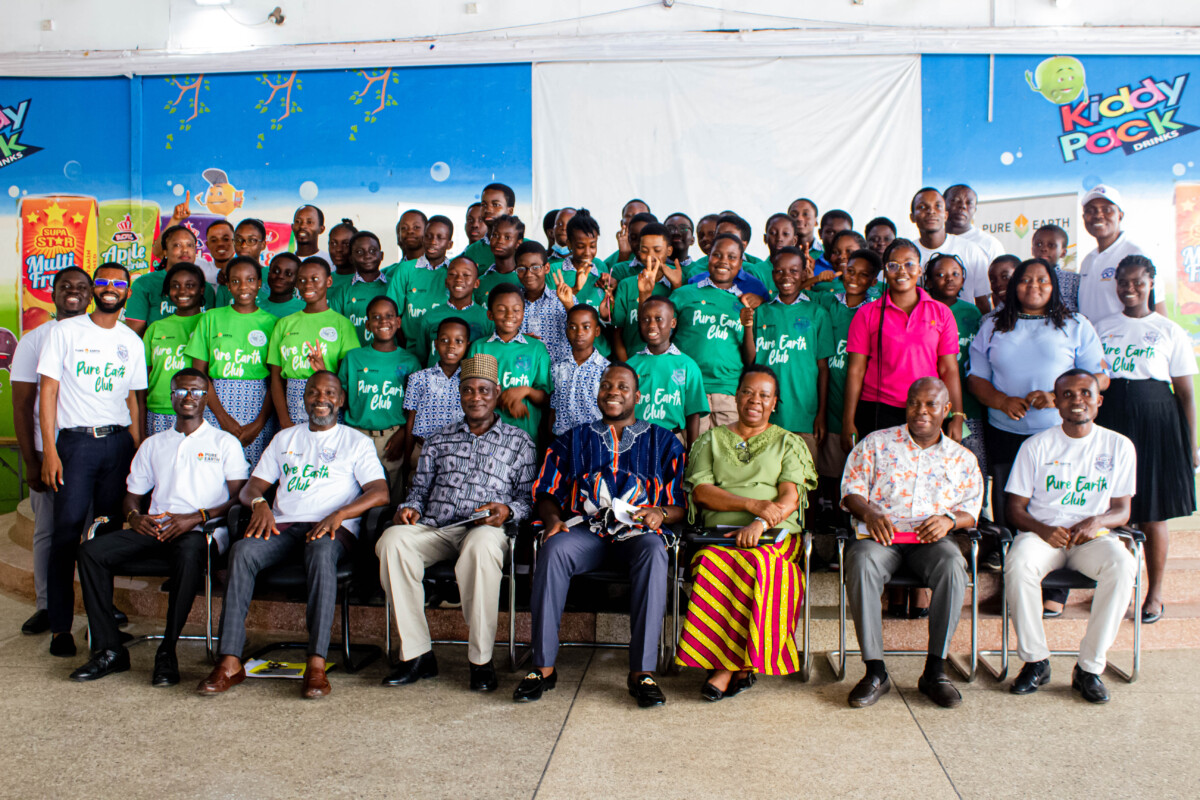 Pure Earth Ghana began ILPPW by raising awareness of recent government commitments made to prioritize the lead issue nationally. The Ghana Environmental Protection Agency (EPA) issued a joint DECLARATION OF NATIONAL ACTION AGAINST LEAD POISONING with the Ghana Health Service, Pure Earth Ghana and UNICEF.
Pure Earth Ghana began ILPPW by raising awareness of recent government commitments made to prioritize the lead issue nationally. The Ghana Environmental Protection Agency (EPA) issued a joint DECLARATION OF NATIONAL ACTION AGAINST LEAD POISONING with the Ghana Health Service, Pure Earth Ghana and UNICEF.
The plan calls for:
- The establishment of a multi-sector government lead reduction program;
- The elimination of polluting sources of Used Lead Acid Battery (ULABs) recycling industries across the country.
- A nationally representative lead poisoning prevalence survey among children and health surveillance for individuals working in formal ULAB factories.
The Ghana team also joined an awareness event for students at the British Council in partnership with UNICEF, and Curious Mind Ghana. On October 25, Esmond Quansah, the Country Director of Pure Earth Ghana provided insights on ILPPW through interviews on Joy News morning show and a panel discussion on GBC Uniiq radio with Ghana Health Service and UNICEF representatives. The week concluded with an educational workshop at Tema Parent Association School, hosting over 500 students, 15 teachers, and representatives from media houses. The event received recognition from Ghana Health Service representatives and campaign activities were featured on social media channels further contributing to lead poisoning awareness efforts.
India: Advocacy Through Webinars and Social Media
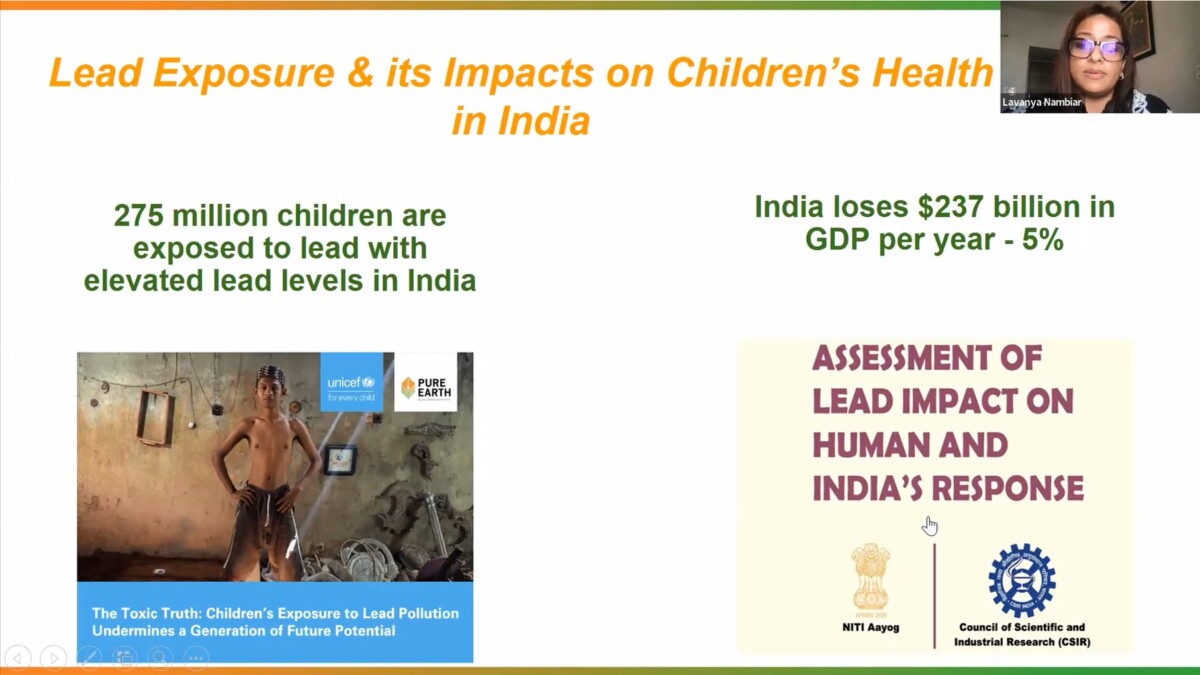
During ILPPW, Pure Earth India Acting Director Lavanya Nambiar participated in an Ashoka University Webinar with representatives from Toxic Links, IISc-Bangalore, and UNICEF. Nambiar addressed the alarming prevalence of lead levels in India, identified new sources of exposure, and presented Pure Earth’s five-phase strategy for cost-effective interventions.
Nambiar was also featured in the launch video for Strengthening Health Systems to Reduce Lead Exposure. Dr. Nitin Ambadekar, Additional Director of Health Services (RCH), State Family Welfare Bureau, Pune Maharashtra, India participated as a panelist in the event.
On Twitter, @PureEarthIndia achieved an average of 191 impressions and three retweets per day, achieving a 9% increase in engagement rates. Notable figures, including Albert Park, ADB Chief; Soumya Swaminathan, Former Chief Scientist of WHO; and Manisha Natarajan, NDTV News Anchor; engaged with and retweeted Pure Earth India’s activities. The commitment is steadfast to sustain this engagement for advancing lead advocacy and communication initiatives.
Indonesia: National Launch and Collaborative Outreach
 The Pure Earth Indonesia Foundation marked the commencement of ILPPW 2023 on October 9 by initiating the formation of a ‘Lead Working Group’ and reporting the findings of Blood Lead Level (BLL) and Risk Mapping Studies to the Ministry of Environment and Forestry. Engaging in various national and international events, including webinars, conferences, and exhibitions, Pure Earth Indonesia actively raised awareness of the issue of lead exposure and its consequences.
The Pure Earth Indonesia Foundation marked the commencement of ILPPW 2023 on October 9 by initiating the formation of a ‘Lead Working Group’ and reporting the findings of Blood Lead Level (BLL) and Risk Mapping Studies to the Ministry of Environment and Forestry. Engaging in various national and international events, including webinars, conferences, and exhibitions, Pure Earth Indonesia actively raised awareness of the issue of lead exposure and its consequences.
Pure Earth Indonesia organized the national launch of the program Strengthening Health Systems to Reduce Lead Exposure on November 10, solidifying collaboration with the Ministry of Health. This event, attended by representatives from multiple government bodies, WHO, UNICEF, and other key stakeholders, featured the signing of a significant partnership. Additionally, outreach, counseling, and dissemination activities were carried out in lead-exposed areas, involving collaboration with medical professionals, local support, and government stakeholders to raise awareness and distribute educational materials.
Peru: Strengthening Epidemiological Surveillance
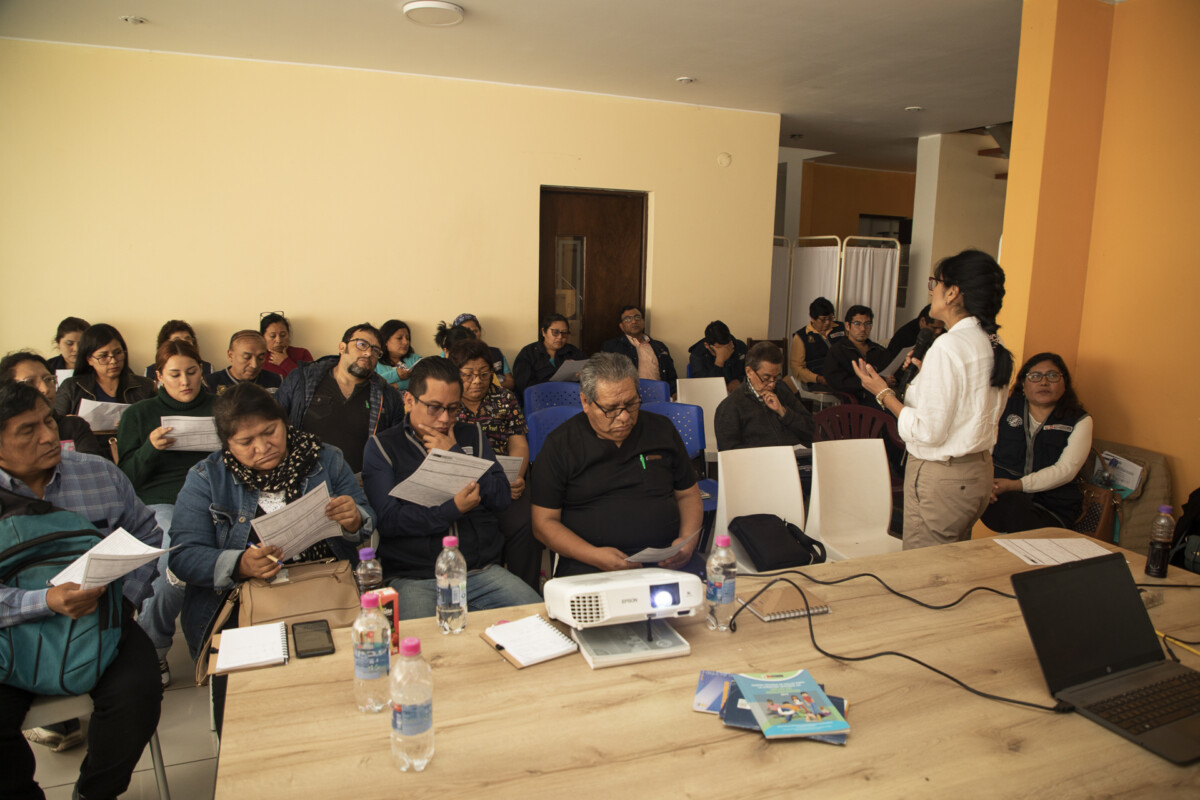 In addition to participating in the global launch of Strengthening Health Systems to Reduce Lead Exposure, Pure Earth Peru collaborated on an event with the National Center for Epidemiology, Prevention and Disease Control of the Ministry of Health. A technical briefing took place on October 27, Public Health Epidemiological Surveillance of Risk Factors for Exposure and Poisoning by Heavy Metals and Metalloids, for sentinel establishments of the Directorate of Integrated Health Networks Lima East jurisdiction in the district of Chaclacayo.
In addition to participating in the global launch of Strengthening Health Systems to Reduce Lead Exposure, Pure Earth Peru collaborated on an event with the National Center for Epidemiology, Prevention and Disease Control of the Ministry of Health. A technical briefing took place on October 27, Public Health Epidemiological Surveillance of Risk Factors for Exposure and Poisoning by Heavy Metals and Metalloids, for sentinel establishments of the Directorate of Integrated Health Networks Lima East jurisdiction in the district of Chaclacayo.
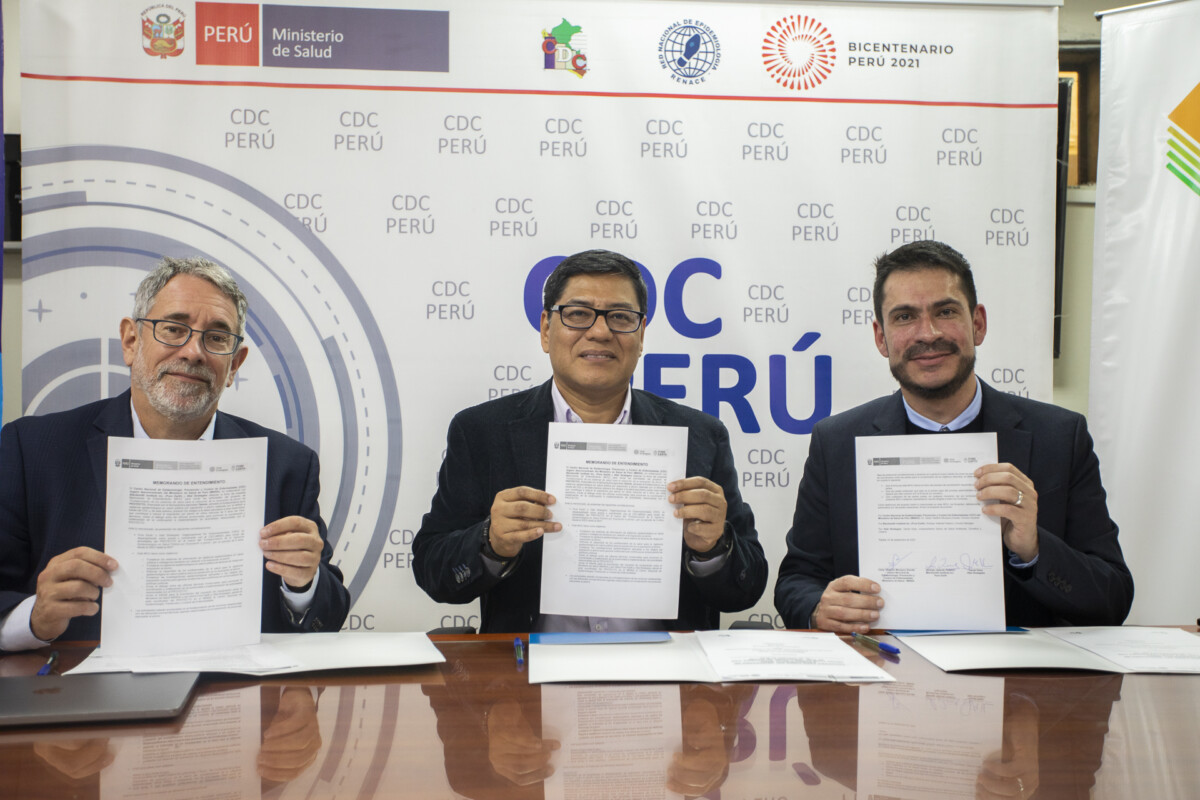 In September, the National Center for Epidemiology, Prevention and Disease Control (CDC Peru) of the Ministry of Health (Minsa) joined Pure Earth and Vital Strategies in signing a Memorandum of Understanding for the Strengthening Health Systems to Reduce Lead Exposure project. Together, these three entities will strengthen information systems, train health professionals, and generate evidence for public policies. This collaboration represents an important step towards preventing lead exposure in children and improving public health in Peru.
In September, the National Center for Epidemiology, Prevention and Disease Control (CDC Peru) of the Ministry of Health (Minsa) joined Pure Earth and Vital Strategies in signing a Memorandum of Understanding for the Strengthening Health Systems to Reduce Lead Exposure project. Together, these three entities will strengthen information systems, train health professionals, and generate evidence for public policies. This collaboration represents an important step towards preventing lead exposure in children and improving public health in Peru.
Colombia: Collaborative Effort for a Lead-Free Future
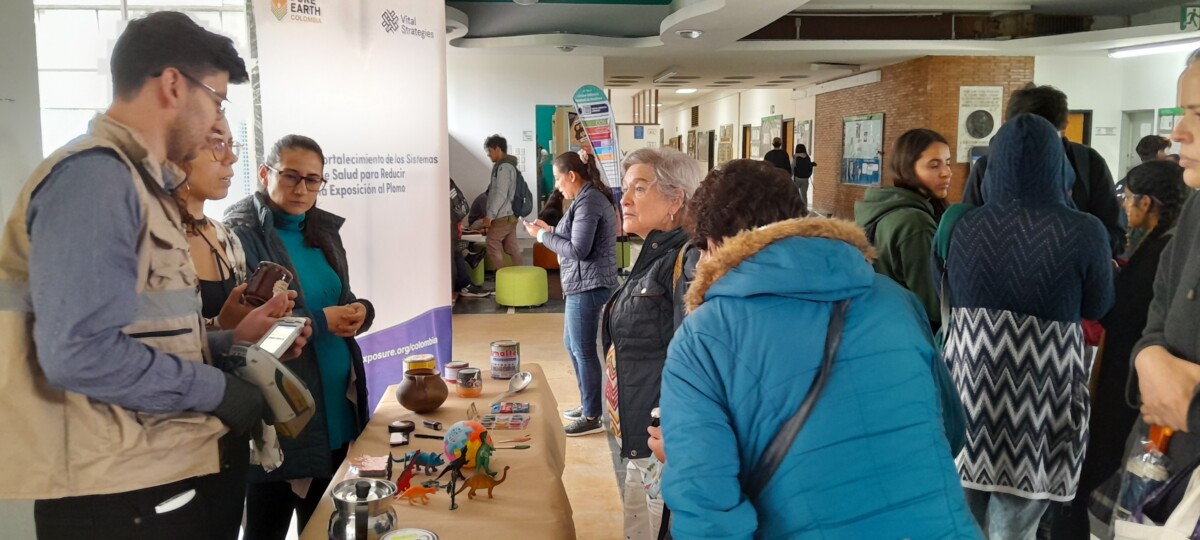 On October 27, Pure Earth Colombia organized a technical meeting together with the Environmental and Occupational Health Research Group of the Doctorate in Public Health of the Interfaculty Program of the National University of Colombia and the support of the Mailman School of Public Health of Columbia University. This meeting was attended by Dr. Ana Navas-Acien, who presented the recent findings of the estimated global burden and cost of IQ loss and mortality from cardiovascular disease due to lead exposure. At the main headquarters of the Faculty of Medicine of the National University of Colombia, Pure Earth Colombia set up a sampling table to demonstrate the possible sources of lead exposure, seeking to increase awareness in the academy about the importance of advancing research on lead exposure sources.
On October 27, Pure Earth Colombia organized a technical meeting together with the Environmental and Occupational Health Research Group of the Doctorate in Public Health of the Interfaculty Program of the National University of Colombia and the support of the Mailman School of Public Health of Columbia University. This meeting was attended by Dr. Ana Navas-Acien, who presented the recent findings of the estimated global burden and cost of IQ loss and mortality from cardiovascular disease due to lead exposure. At the main headquarters of the Faculty of Medicine of the National University of Colombia, Pure Earth Colombia set up a sampling table to demonstrate the possible sources of lead exposure, seeking to increase awareness in the academy about the importance of advancing research on lead exposure sources.





